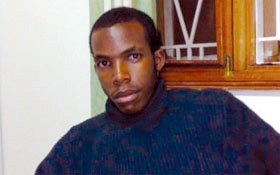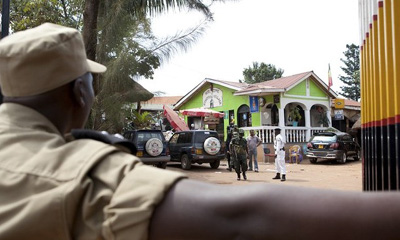Since the beginning of Somalia’s Islamist extremist insurgency, the Al-Shabaab militia has targeted journalists and others that it considers opposed to its goals. Al-Shabaab is now reaching beyond Somalia’s borders, as the group claimed responsibility for two bomb attacks Sunday evening that rocked Uganda’s capital, Kampala, and left an estimated 74 people dead, including radio presenter Stephen Tinkamanyire.
Tinkamanyire had gone to Kyadondo Rugby Club in the Ugandan capital, Kampala, to emcee a World Cup viewing event sponsored by his media company New Vision. An explosion hit the club just as Spain and the Netherlands went into extra time, shortly after another blast had hit Ethiopia Village, a restaurant in the Kampala suburbs, where customers were also watching the match. Tinkamanyire, a part-time presenter for local radio station Vision Voice, fell unconscious and was taken to a local hospital, New Vision reporter Norman Katende told CPJ. Tinkamanyire died from his injuries at around noon on Monday, another victim in what some are calling Uganda’s 7/11 terrorist attacks.
Ugandan journalists, bloggers, and citizen journalists who witnessed the bombings expressed their shock in real-time on social networking sites like Twitter. Albert Ahabe, a local sports journalist, had been tweeting about the World Cup and the Lebron James free agency @tragicanon until he wrote to his followers on Monday morning “Hey tweeps, am back, had to deal with seeing peeps die just next to me and having human flesh and blood on my clothes, damn scary!” Stone Atwine, another journalist tweeting @StoneAtwine reassured a friend about his well-being: “I did sleep but I think my ears are still messed up from the sound of the explosions.” Other journalists like Mark Keith Muhumuza (@mumakeith) relayed emergency info: “blood shortage being reported in Mulago. In case you want to donate, there is a blood bank in Nakasero.” Trevor Snapp, a Kampala-based photojournalist (@20yof) shared a slideshow of photographs taken after the blasts.

But the tweets of @tinkaman were silenced. One of Tinkamanyire’s last tweets, on July 8, read simply “the iphone 3G and blackberry which is better???” One of his friends (@darlkomu) posted the following about the late journalist: “@tinkaman was a presenter on Vision Voice for a while and was trying to get on TV. He always dressed swanky.” The young presenter had finished college a year earlier and had interned with Vision Voice, gradually getting opportunities as a radio presenter, “but his budding career was cut short,” said Geoffrey Ssebaggala of the Human Rights Network of Journalists.
Attention is now turned to Al-Shabaab, which said it launched the attacks in retaliation for Uganda’s involvement in the African Union peacekeeping mission in Somalia. “We warned Uganda not to deploy troops to Somalia; they ignored us,” said Sheik Ali Mohamud Rage, Al-Shabaab’s spokesman, in an Associated Press report.
The implications of the attacks are particularly daunting for dozens of Somali journalists who fled Al-Shabaab threats in Somalia to seek refuge in East Africa and beyond. Last month, exiled journalist Abdulahi Ibrahim Dasa, the South Africa correspondent of London-based Somali language international broadcaster Universal TV, was among several journalists to report death threats from Al-Shabaab over coverage of the Mail & Guardian’s publication of a cartoon of the Prophet Muhammad. In response, Al-Shabaab issued a statement stating that “the broadcaster is prohibited from operating in territories ruled by the Somali Islamists,” according to news reports.
Whether in South Africa, Kampala, or Nairobi, few refugee journalists feel safe, fearing Al-Shabaab may track them down. “I still get threatening messages on my phone and hardly leave my tiny room,” one exiled Somali journalist who spoke on condition of anonymity due to security concerns. Kampala Dispatch, a local monthly, asked in its Twitter account, @dispatchug: “Will this be remembered as 7/11? Kampala may never be the same again…”
